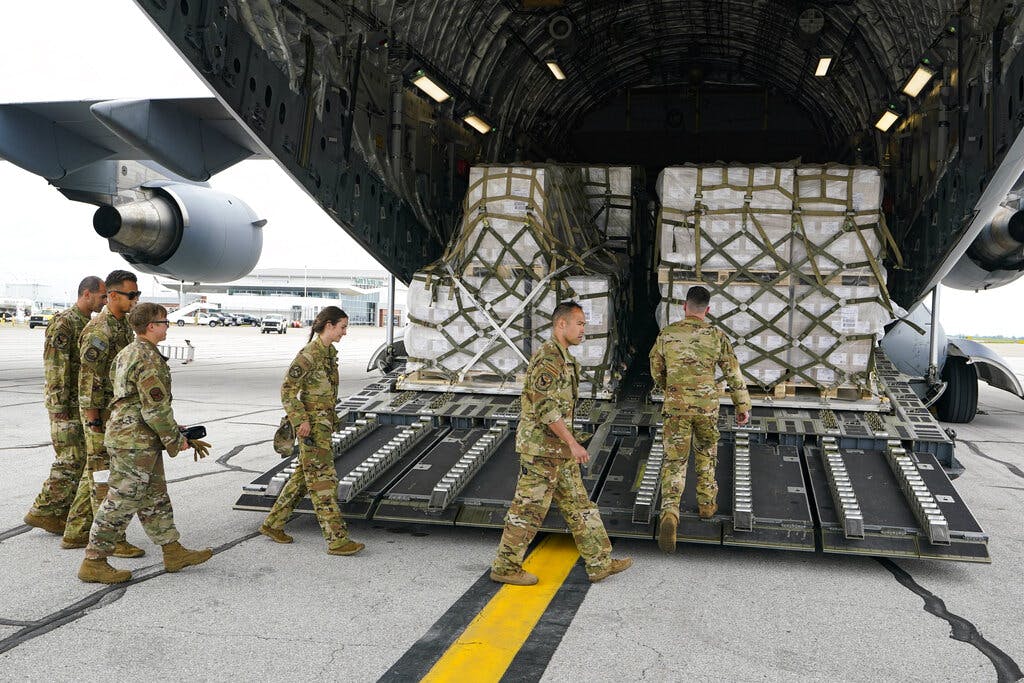House Set To Burp Baby Formula Makers, as First Airlift From Germany Reaches Indianapolis
Wartime measures speak to the severity of the shortages at a time when three-quarters of American infants rely on baby formula.

Lawmakers will grill the FDA commissioner, Robert Califf, and executives from the top three baby formula manufacturers today during a House Energy and Commerce Subcommittee on Oversight and Investigations hearing that could get heated.
“The hearing will examine the nation’s infant formula product recall, shortage, steps taken to increase supply, and what further action is necessary to ensure families’ access to safe formula across the country,” a memo from House Committee on Energy & Commerce chairman, Representative Frank Pallone of Florida, states.
The shortages reached crisis levels this past month. Nationwide, 43 percent of baby formula was out of stock in the first week of May, and in several states that number topped 50 percent, according to retail analytics firm Datasembly.
On May 18, President Biden invoked the Defense Production Act to speed up the manufacture of infant formula and announced “Operation Fly Formula” to use DoD-commissioned commercial aircraft to import baby formula from overseas.
These wartime measures speak to the severity of the shortages. Three-quarters of U.S. infants rely on baby formula for all or some of their nutrition by six months of age, according to the CDC.
Lawmakers are expected to question Dr. Califf and a FDA deputy commissioner about the FDA’s slow response to dangerous sanitary conditions reported in the Abbott plant at Sturgis, Michigan.
A former plant employee sent senior FDA officials a whistleblower report detailing the problems in October – months before two infants died and others were sickened with Cronobacter infections. Yet the FDA didn’t issue a public safety warning on potentially contaminated infant formula until February 17, the day Abbott initiated its voluntary recall.
While the Biden administration continues to pin much of the blame for the formula shortages on Abbott, the company denies any liability in the infant deaths and illnesses. The Cronobacter strains tested in the sick children did not match any strains found in the plant. “CDC concluded its investigation with no findings of a link between Abbott formulas and infant illnesses,” an Abbott press release states.
Members will likely question why the FDA and the Biden administration didn’t plan for severe formula shortages after the recall, since Abbott controls 42 percent of the U.S. baby formula market and holds the majority of exclusive state WIC contracts.
Abbott’s Sturgis plant also produced many of the specialty baby formulas required by children with allergies and health issues. Several infants with health issues have been hospitalized in recent weeks because their parents couldn’t find the specialty formulas they require.
The Abbott recall exacerbated already existing formula shortages due to supply chain issues and labor shortages. The formula shortages have also exposed serious flaws in the way the U.S. formula market operates, with tariffs and strict regulations for formula imported from overseas and sole-source contracting for WIC, which subsidizes nearly 50 percent of U.S. formula sales. As a result, Abbott, Gerber Products Company, and Reckitt control more than 90 percent of the domestic formula market.
Lawmakers will likely grill an Abbott senior vice president, Christopher Calamari, on the company’s safety standards and its near monopoly on state WIC contracts. Last Monday, Abbott announced it had reached an agreement with the FDA to reopen the Sturgis plant in the next week. Abbott says it will take six to eight weeks for formula to hit store shelves once production resumes.
Executives from Reckitt and Gerber are also set to testify during the hearing Wednesday.
The House Appropriations Subcommittee on Agriculture, Rural Development, Food and Drug Administration, and Related Agencies is also scheduled to hold a separate hearing Wednesday on the formula shortages.
These hearings come after some good news on the formula front this past weekend. The first DoD-commissioned aircraft filled with baby formula arrived in Indianapolis Sunday. The White House announced a second flight expected to leave Germany for Washington Dulles International Airport in the coming days. The White House said roughly 1.5 million 8-ounce bottles of three specialty formulas for children with allergies and health issues will arrive as part of “Operation Fly Formula” this week.
“These formulas have been prioritized because they serve a critical medical purpose and are in short supply in the United States because of the Abbott Sturgis plant closure,” a White House statement read. The formula will be distributed to hospitals and infants with health issues.
The HHS secretary, Xavier Becerra, authorized the first Defense Production Act orders Sunday for Abbott to secure raw material for formula and for Reckitt to acquire single-use products such as filters.
These hearings may shed new light on the formula shortages. While testifying in a House appropriations subcommittee last week, Dr. Califf said he would provide more information on the FDA’s slow response to the Abbott whistleblower at the hearing Wednesday.
The hearing will also likely see grandstanding from lawmakers hoping clips of their impassioned questioning will make the rounds of cable news or Twitter. This is an election year, after all.

